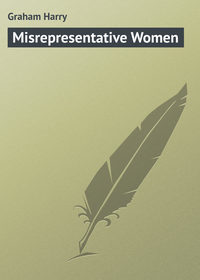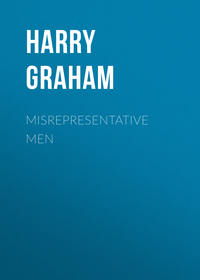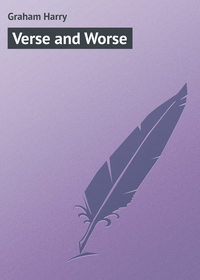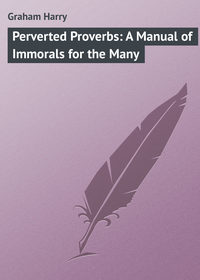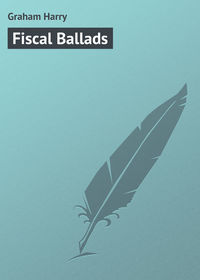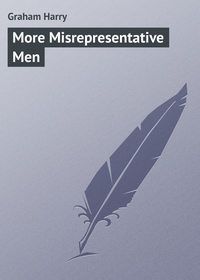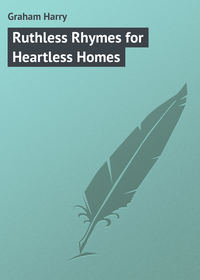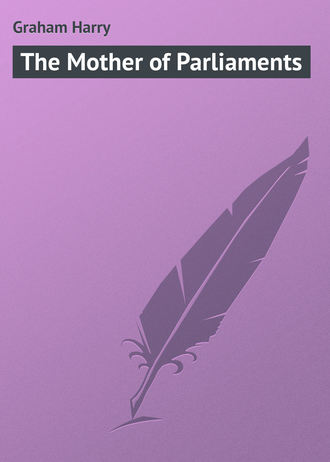 полная версия
полная версияThe Mother of Parliaments
Only once since the attempt of Colonel Pride to purge the House have representatives of the law traversed the bar of the Commons. The Palace of Westminster, within and without, is guarded by members of the Metropolitan Police, but they studiously refrain from trespassing upon the sacred ground that lies within the bar of either House. During the Speakership of Mr. Gully, however, in 1901, several Irish members declined to leave the House when ordered to do so for a division, and resisted the Sergeant-at-Arms and his myrmidons. Stout police-constables were therefore summoned, and bore the unwilling members struggling to the door in that kindly but determined grasp which, as Suffragettes have since learnt by experience, is one of the chief charms of the A Division.
The right of the Houses of Parliament to regulate their own internal concerns has always been admitted. In Henry VI.'s reign the Lord Chief Justice informed the House of Lords that the High Court of Parliament "is so high and mighty in its nature that it may make law, and that that is law it may make no law, and the determination and knowledge of that privilege belongs to the Lords of the Parliament, and not to the Justices."271 Courts of law have never interfered with anything that took place in Parliament unless it were of an essentially criminal character. Parliament, however, has not always shown the same consideration for courts of law. In 1703, a man named Ashby brought an action against the constables of Aylesbury for refusing to record his vote at an election. The Commons thereupon declared it a gross breach of privilege that any court other than themselves should presume to try a case that had any reference to an election, and proceeded to take into custody everybody concerned in the affair. The Speaker went in person to the Court of Queen's Bench to summon the Lord Chief Justice to attend upon the Commons and explain the law's unjustifiable interposition. For once, however, the representative of Parliament was forced to beat an undignified retreat. Old Lord Chief Justice Holt was a quick-tempered man, and not at all awed by the presence of Speaker Smith. "If you do not depart from this court," he said to him in his sternest voice, "I will commit you, though you have the whole House of Commons in your belly!"
This was but one example of the numerous collisions between Parliament and the law, resulting from the former's rigid insistence upon bygone privileges, and the difficulty of settling which questions should be left to the arbitrament of either authority. If matters were left to the decision of the Commons, it is clear that everything would probably be brought within the scope of privilege; if to courts of law, all privilege would possibly be abolished. Some thought the former alternative was the least to be feared. "While men are but men," said Lord Jeffrey, "we must be at the mercy of a fallible and irresponsible despotism at best; and if we have to choose, as in an open question, few would hesitate to say that they would rather have the House of Commons for a despot than the courts of law."272 But the matter became ridiculous when Parliament insisted on interfering in questions which it had clearly no right to decide. In 1721, for instance, the House of Commons committed the proprietors of a paper called "Mist's Journal" to Newgate for publishing an article favouring the restoration of the Pretender. This could scarcely be considered a breach of privilege, but the House thought itself empowered to deal with all political offenders. Since that time no one has been committed, except for a distinct breach of privilege, or for contempt of Parliament. The latter term, however, embraces the most trivial offences. In 1827, a stranger who was visiting the House of Lords left his umbrella in the cloak-room, by order of the attendant. On returning to claim his property at the end of the sitting, he found that his umbrella – following the universal fashion of that elusive article – had disappeared. He proceeded to bring an action against the doorkeeper, and was awarded damages amounting to £1 0s. 4d. Lord Chancellor Eldon thereupon summoned him to the bar of the Lords, and forced him, on pain of imprisonment, to refund the value of his umbrella and apologise. Four years later, the printer of "The Times" was fined £100 and sent to Newgate for having dared to call the Earl of Limerick "a thing with human pretensions."
The House of Lords has always considered itself empowered to inflict fines as well as imprisonment for a fixed period. When the Commons confine an offender they may put no term to his sentence, and he is released automatically on a prorogation. For the last two hundred years they have ceased to exercise the right of fining delinquents, but in early days, as we have seen, they often inflicted financial penalties, and stimulated the attendance of their own members by an inroad upon their pockets.
At the very commencement of parliamentary history the shires or boroughs whose representatives did not appear in their places in Parliament were fined £100. In 1580, any knight who stayed away for a whole session was fined £20, while citizens and burgesses were fined £10. Besides this, members lost their pay during absence, and, by an Act of Henry VIII., boroughs and shires were exonerated from the payment of wages to members who left Parliament before the end of the session without the Speaker's permission.
In similar fashion peers and bishops were punished for non-attendance, the size of their fines varying in proportion to the rank of the offender. An ordinance framed in Henry VI.'s time, about 1452, imposed fines of from £40 to £100 upon absentee peers, the sum thus raised to be appropriated to the defence of Calais.273 In 1625 a fine of 5s. per day was imposed upon peers who disregarded their summons to Parliament, and we read of the Cinque Ports being mulcted in the sum of a hundred marks because their baron absented himself.274 When the Bill for degrading Queen Caroline was before the Lords a fine of £100 was imposed during the first three days, and £50 for any subsequent day, on which any peer did not attend, unless he could prove illness or unavoidable absence. By a former Standing Order, every lord who entered the House after prayers was fined, if a baron or a bishop, 1s.; if of higher rank, 2s. What a contrast to these degenerate days in which the Lord Chancellor, the bishop, and one peer, hunted up for the purpose, form a reluctant congregation!
In the days of Charles I. penalties were extremely necessary if the business of Parliament was to be carried on at all. Members took their duties lightly, and at times not more than a dozen would appear in their places at Westminster. Prynne describes them as wasting their time in taverns, playhouses, dicing-houses, cockpits, and bowling alleys, "rambling abroad to such places at unreasonable Hours of the Night in antique Parliamentary Robes, Vestments fitter for a Mask or Stage than the gravity of a Parliament House." They would only come to peep into the House once or twice a week, he says, to show themselves in such disguises, and ask, "What news?"275
In the Parliament which passed the Grand Remonstrance there were sometimes as many as two hundred absentees. To remedy this evil it was proposed by Strode that any member who stayed away without leave should be fined £50, or expelled. This proposal, says D'Ewes, "was much debated, but laid aside."276 Even those members who attended did so in a casual and perfunctory fashion, which proved a source of great inconvenience to colleagues who took their responsibilities more seriously. In order, therefore, to enforce punctuality, minor fines were inflicted, and in 1628 an order was made that any member who came in late for prayers must contribute 1s. to the poor box. The House met at seven or eight o'clock in the morning in those days; members therefore had some excuse for arriving late, and the system had to be temporarily abandoned in 1641, owing to the interruption of business resulting from the cries of "Pay! Pay!" with which unpunctual persons were greeted. "Scenes" would often take place when members arrived just as the clock was striking, and either refused to pay their shillings, or flung them angrily upon the floor for the Sergeant to pick up. Later on, when the House rose at midday, instead of in the afternoon, the regulation was revived. Speaker Lenthall himself was late on one occasion, much to the delight of the House, and, his attention being drawn to the fact, threw his shilling down on to the table with every sign of annoyance.
As late as the middle of the eighteenth century members did not allow their parliamentary duties to interfere with their social pleasures. Burke once complained because the Commons rose early in order to attend a fête-champêtre given by Lady Stanley.277 And in 1751 Horace Walpole told a friend that on the day appointed for the debate on the Naturalization Bill the House "adjourned to attend Drury Lane."278
From time to time attempts were made to secure the attendance of members by means of a "call of the House," of which due notice was given, members who failed to answer their names being punished. A "call" which was taken in October, 1647, resulted in the discovery that one hundred and fifty members were absent, and after a prolonged debate it was decided that they should be ordered to pay a fine of £20 each. This system has fallen into disuse, the last "call" taking place in 1836.279 Five years before this date, however, on March 17, 1831, three members, including Lord F. L. Gower, who were not in their places when their names were called, were given into the custody of the Sergeant-at-Arms, and compelled to pay fines ranging from £8 to £10.280
A member who offends against any of the rules or orders of the House of Commons may be dealt with in several ways, either by being silenced, suspended, expelled, or committed to prison. If any member indulges in irrelevance or tedious repetition the Speaker can call upon him to discontinue his speech. Should the offence against order be more serious the Speaker may either order the offender to withdraw from the House or may "name" him, whereupon, on the motion of the Leader of the House, he is suspended from its service. The practice of "naming" originated in 1841, when Speaker Lenthall, after trying in vain to silence certain noisy members who were chatting together under the gallery, called upon Sir W. Carnabie by name. In former days little unpleasantness seems to have attached to the process of "naming," and when Speaker Onslow was asked what the result would be of "naming" a refractory member he could but answer, "Heaven only knows!"281
To-day a Speaker may order any member whose conduct is unruly to withdraw from the House for the remainder of the sitting. By a Standing Order any member wilfully abusing the regulations of the House can be "named" by the Chairman or Speaker, and suspended until the end of the session, unless the House decides to re-admit him sooner. When a member is "named," the Sergeant-at-Arms escorts him from the precincts of the chamber, and he is seen off the premises by the police. Should he decline to obey the Sergeant's invitation to accompany him beyond the bar, a couple of elderly attendants step forward and prepare to expedite his progress towards the door. If force has to be used in order to make a member withdraw, his suspension lasts unquestionably until the end of the session.
The punishment of suspension had not been used for two hundred years when it was revived in 1877. Immediately following the extraordinary scenes of obstruction which gave rise to Speaker Brand's resolute action, a wholesale suspension of Irish members took place. On February 3, 1881, Parnell and more than a score of his colleagues were named and suspended for refusing either to take part in a division or to withdraw from the House. When the "closure" was applied for the first time in February, 1885, a scene of uproar ensued, as a result of which Mr. O'Brien was suspended, and in March, 1901, as already mentioned, twelve Irish members who declined to leave their places for a division were forcibly removed by the Sergeant-at-Arms and police, and subsequently suspended.
Committal to the custody of the Sergeant-at-Arms is nowadays an uncommon parliamentary punishment, Bradlaugh being one of the last members to be confined in the Clock Tower.282 Both Houses, however, have the legal right of imprisoning (at Holloway or elsewhere) any British subjects who offend against their privileges.
Expulsion from the House of Commons is, perhaps, the direst penalty that can be inflicted upon a member. In 1714, Lord Cochrane and Steele the essayist were both expelled – the one for spreading false reports on the Stock Exchange, the other for publishing "The Crisis," a pamphlet antagonistic in tone to the Government. Some fifty years later Wilkes, who had been prosecuted for his articles in the "North Briton," was also expelled from the House. The voters of Middlesex at once re-elected him, but Parliament declared his opponent, the defeated candidate, to be duly elected. In 1782, however, the resolution against Wilkes was erased from the journals of the House. At the time of the South Sea Bubble a number of members were turned out for fraud. Since then, however, the list of expulsions has dwindled, until to-day such a thing would be considered a rare and unique occurrence. Though expulsion does not preclude re-election, a grave moral stigma attaches to the penalty, and a modern member who incurred it would find but little consolation in the reflection that he shared this invidious distinction with men of no less eminence than Steele and Walpole.
CHAPTER XI
PARLIAMENTARY DRESS AND DEPORTMENT
Parliament to-day differs in very many respects from the Parliaments of the past; nowhere does that difference express itself more forcibly than in the remarkable improvement in parliamentary manners of which the last century has been the witness.
Sir John Eliot's well-known words are far more applicable to the modern House of Commons than they can ever have been three hundred years ago. "Noe wher more gravitie can be found than is represented in that senate," he said, speaking of the Chamber of which he was so distinguished a member. "Noe court has more civilitie in itself, nor a face of more dignitie towards strangers. Noe wher more equall justice can be found: nor yet, perhaps, more wisdom."283 It was no doubt a pardonable sense of pride that caused Sir John to take so optimistic a view of the assembly of his day, for there is ample evidence to show that the House of Commons of the sixteenth and seventeenth centuries was not always the grave or civil chamber which he describes. Its passions were not invariably under control; they flared up into a blaze on more than one occasion. The appearance of Cardinal Wolsey to demand a subsidy for his royal master was the signal for an outburst of feeling which almost ended in bloodshed; the Long Parliament was in a perpetual state of storm and disorder.
During the Stuart period, and even more so towards the close of the Commonwealth, the conduct of the Commons was anything but decorous. The Speaker of those days frequently found it impossible to maintain order; the Chair was held in little respect. The behaviour of the House was but little better than that of the Irish Parliament in the time of Elizabeth, which spent most of its time in futile argument and disagreement: "The more words, the more choler; and the more speeches, the greater broils."284 It was at the commencement of the seventeenth century that the first violent manifestations of party feeling took place which were afterwards destined to cause so many "scenes" in the Commons. Owing to the constant discord prevalent there, that House was, by one member, likened to a cockpit; another wrote to Sir Dudley Carleton that "many sat there who were more fit to be among roaring boys"; and a third declared his desire to escape, not only to the Upper House, but to the upper world altogether.
During the lengthy debates on the publication of the Grand Remonstrance in 1641, feeling ran so high that members would have sheathed their swords in one another's vitals but for the timely intervention of Hampden. Even those who did not actively assault each other seem to have expressed so much malice in their looks as to cause serious alarm to their opponents. In 1642, for instance, Sir H. Mildmay complained to the House that the member for Coventry "looked very fiercely upon him when he spoke, and that it was done in an unparliamentary way."285
In the reign of Charles II. riotous debates were of frequent if not daily occurrence. When Titus Oates appeared at the bar of the Commons to accuse Queen Katherine of high treason, partisan excitement reached a dangerous pitch. In 1675, a free fight between Lord Cavendish and Sir John Hanmer was only prevented by the tact of Speaker Seymour, who resumed the Chair on his own responsibility – the House was in Committee at the time – and managed to quell the disturbance before blows had been exchanged.
Scenes of a less serious nature took place on many occasions. Andrew Marvell, the much respected member for Hull, was entering the House of Commons one morning when he accidentally stumbled against the outstretched leg of Sir Philip Harcourt. In recovering himself, Marvell playfully dealt Sir Philip a resounding box on the ear. The Speaker at once drew the attention of the House to this affront, and members became greatly excited. When Marvell was at length allowed an opportunity of speaking, he explained that "what passed was through great acquaintance and familiarity" between Sir Philip and himself, and that his blow was merely a token of deep affection. After a heated debate the matter was allowed to drop, though other members of the House must subsequently have fought shy of making friends with a man who expressed his liking in so boisterous and painful a fashion.286
The fact that many members of both Houses frequently attended the debates in an advanced stage of intoxication was, perhaps, the cause of most of the parliamentary unpleasantness of past days. At Westminster, indeed, the sobriety of legislators was scarcely more noticeable than at Edinburgh, where the Scottish Parliament that met on the Restoration of Charles II. was forced to adjourn, owing to the fact that the Commissioner Middleton and most of the members were too drunk to deliberate.
Instances of parliamentary intemperance and its natural results were common enough in those days. In 1621, a quarrel arose in the House of Lords between the Earl of Berkshire and Lord Scrope. The former quickly lost his temper and laid violent hands on his colleague. For this he was called to the bar, censured by the Lord Chancellor, and committed to the Tower. Again, at a conference between the two English Houses, in 1666, the Lords behaved to one another with extreme discourtesy. The Duke of Buckingham opened the proceedings by leaning across Lord Dorchester in a rude and offensive manner. The latter gently but firmly removed the intruding elbow, and on being asked if he were uncomfortable, replied that he certainly was, and that nowhere but in the House of Lords would the Duke dare to behave in so boorish a fashion. Buckingham irrelevantly retorted that he was the better man of the two, whereupon Dorchester told his noble colleague that he was a liar. The Duke then struck off the other's hat, seized hold of his periwig, and began to pull him about the Chamber. At this moment, luckily, the Lord Chamberlain and several peers interposed, and the two quarrelsome noblemen were sent to the Tower to regain control of their tempers.
The Commons meanwhile were behaving in no less reprehensible a manner. "Sir Allen Brodricke and Sir Allen Apsly did come drunk the other day into the House," says Pepys, "and did both speak for half an hour together, and could not be either laughed, or pulled, or bid to sit down."287 Such a state of things was so usual in either House at the time as to provoke neither comment nor criticism. The tone of society may be gauged from the fact that at the end of the seventeenth century it was not thought peculiar for a party of Cabinet Ministers, including the Earl of Rochester, then Lord High Treasurer of England, stripped to their shirts and riotously intoxicated, to climb the nearest signpost in order to drink the King's health from a suitable point of vantage.288
The usual condition of the Commons during the hearing of election petitions a hundred years later has been forcibly described by Thomas Townshend. "A House of twenty or thirty members," he says, "half asleep during the examination of witnesses at the bar, the other half absent at Arthur's or Almack's, … returning to vote so intoxicated that they could scarcely speak or stand." It must, however, be admitted that members' frequent potations did not always affect their utterance. Indeed, they sometimes appear to have had an entirely opposite result. In 1676, Lord Carnarvon, under the influence of wine, made a remarkably humorous and able speech in the House of Lords, causing the Duke of Buckingham to exclaim, "The man is inspired, and claret has done the business!" Charles Townshend, too, whom Burke called the delight and ornament of the House, and who was offered the Chancellorship of the Exchequer by Pitt, seems to have been far more eloquent in his cups than at any other time. He is chiefly famous for making what is known as the "Champagne Speech" of May 12th, 1767 – a speech which, as Walpole declared to a friend, nobody but Townshend could have made, and nobody but he would have made if he could. It was at once a proof that his abilities were superior to those of all men, and his judgment below that of any man. It showed him capable of being, and unfit to be, Prime Minister. "He beat Chatham in language, Burke in metaphors, Grenville in presumption, Rigby in impudence, himself in folly, and everybody in good humour."289 Half a bottle of champagne, as Walpole said, poured on genuine genius, had kindled this wonderful blaze.
Pitt, as is well known, possessed a marvellously strong head. He and Dundas one evening finished seven bottles without the slightest difficulty, and he would often fortify himself with whole tumblers of his favourite wine before going down to Westminster.290
It was during the famous debate of February 21, 1783, when Fox was defending the Peace of Paris, that Pitt retired behind the Speaker's Chair to be actively unwell, at the same time keeping his hand up to his ear that he might miss none of his rival's points. His conduct on this occasion affected one of the sensitive clerks at the Table with a violent attack of neuralgia – a providential division of labour, as Pitt pointed out, whereby he himself had enjoyed the wine while the clerk had the headache! It has often been considered surprising that Pitt should have been able to exercise such influence on the House after drinking three bottles of strong port, but, as a distinguished statesman has observed, it must be remembered that he was addressing an assembly few of whose members had drunk less than two.
At the commencement of the nineteenth century, when Abbot was in the Chair, the member for Southampton, Fuller by name, entered the House in a hazy but happy frame of mind, which induced him to mistake the Speaker in his wig for an owl in an ivy bush. He was promptly removed by the Sergeant-at-Arms, and kept in custody until his eyesight had resumed its normal condition.291 Another member, Sir George Rose, arrived at Westminster in a condition which inspired him to call upon the Speaker for a comic song, and led to his being taken in charge by the Sergeant-at-Arms.
Lord Chancellor Brougham used to refresh himself copiously while upon the Woolsack, and, during his four-hour speech on the Reform Bill, drank no less than five tumblers of mulled port and brandy.292 There was, therefore, perhaps some reason for his extreme indignation when the Duke of Buckingham referred to the possibility of disturbing him in the midst of his "potations pottle deep" – a quotation which Brougham did not recognize, and which evoked from him a violent outburst.293
Peers and members of Parliament to-day have no such weaknesses, or, at any rate, refrain from exhibiting them in Parliament. There have been, of course, exceptional instances, even in modern times, of persons speaking under the influence of drink, but these are so rare as scarcely to deserve mention. An Irishman in a conspicuously genial frame of mind referred to a Conservative member in the lobby as a "d – fool." The latter overheard this remark and contemptuously retorted that his honourable friend was drunk. "I may be drunk," admitted the Irishman, "but to-morrow I shall be sober. Whereas you'll be a d – fool to-morrow, and the next day, and all the rest of your life!" During one of those interminable sittings of 1877, when obstruction was at its height, another Irishman, "weary with watching, and warm with whisky," applied the same opprobrious term to a fellow member. On being ordered to withdraw the expression he explained that it "was only a quotation." "Whether the remark of the hon. gentleman can be explained by a quotation or a potation," said the Chairman, "it is equally inadmissible, and I must beg him in future to mind his p's and q's."294


